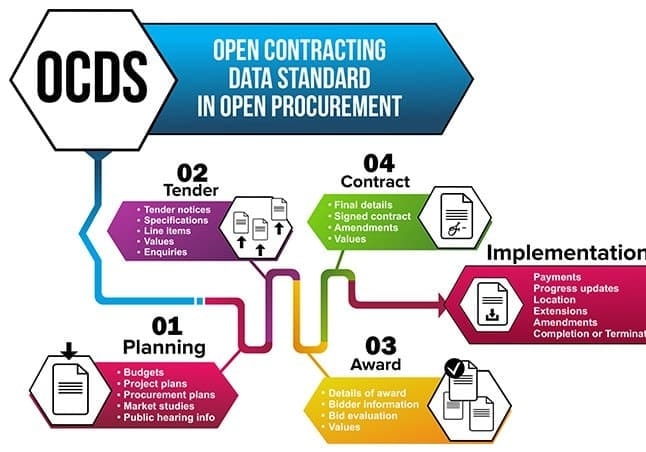In the realm of procurement and contracting, a groundbreaking approach is revolutionizing how governments and organizations manage public funds. This cutting-edge practice, known as Open Contracting Data Standard (OCDS), introduces an innovative framework to foster transparency, effectiveness, and integrity in public contracting processes. Developed in 2014 by the World Bank in collaboration with the Omidyar Network, OCDS holds the potential to reshape the landscape of government expenditure.
Unlocking Insights through Open Contracting Data Standard (OCDS)
Open Contracting Data Standard (OCDS) emerges as a dynamic open data standard that pioneers the online dissemination of structured information at every phase of the contracting journey. This process spans from initial planning to seamless implementation. OCDS, as defined by open-contracting.org, encompasses both procurement and contract administration aspects, including the crucial stage of compensating contractors and providers for their delivered goods and services.
Transparency at Every Level
OCDS operates on a three-tier disclosure model, each catering to different levels of information granularity. The fundamental level encompasses tender and award notifications. The intermediate stage advances beyond basic data by incorporating unique identifiers and JSON-based classifications. Notably, this tier also encompasses downloadable, structured excel files in CSV format, providing comprehensive accessibility.
A Leap into Advanced Detail
The apex of OCDS introduces the advanced level, encompassing intricate aspects such as contract amendments and updates. The dataset extends to include comprehensive contract particulars and the real-time status of both physical and financial progress. This enriched level of detail facilitates a deeper understanding of the contracting landscape.
Harnessing the Power of Unique Identifiers
Comparable to an ISBN for published books, the unique identifier serves as the backbone of OCDS. This identifier is affixed to contractors, ensuring their traceability and accountability. This transformative feature empowers anyone with internet access to delve into the contracting history of an entity like Company X. This capability extends to scrutinizing completed and ongoing contracts, fostering a higher level of transparency.
Unleashing the Potential
The strategic interlinking of data sets utilizing JSON and APIs paves the way for OCDS's unparalleled functionality. These interconnections facilitate dynamic analyses and empower stakeholders to unearth insights that were previously concealed.
A Roadmap to Better Governance
The implications of OCDS transcend the realm of data standardization. By embracing and deploying structured, standardized data about public contracting, stakeholders can unlock a myriad of advantages. These include:
- Enhanced Value for Money: Governments can optimize their resource allocation, yielding better returns on public spending.
- Elevated Fairness: OCDS fosters an equitable competition arena, leveling the playing field for businesses of all sizes, particularly smaller enterprises.
- Elevated Quality of Goods and Services: Through comprehensive insights, stakeholders can drive the delivery of high-caliber goods, works, and services to citizens.
- Fraud Prevention: OCDS serves as a shield against corruption and fraudulent activities, ensuring that public funds are channeled toward their intended purposes.
- Empowering Smart Analysis: The abundance of data paves the way for astute analyses, nurturing innovative solutions to complex public challenges.
Trust and Transformation
OCDS champions the notion that public access to open contracting data is the bedrock of trust-building. This approach guarantees that the substantial investments made by governments yield improved services, superior goods, and transformative infrastructure projects. Currently, OCDS is gaining traction in numerous countries, encompassing Canada, the United Kingdom, Mexico, Romania, Moldova, Ukraine, Colombia, Costa Rica, and Paraguay.
PhilGEPS: A Collaborative Path Forward
The Philippine Government Electronic Procurement System (PhilGEPS) already facilitates access to procurement-related data via its website. While the platform presently offers downloadable CSV files of tender and award notices, its evolution in the direction of open data initiatives such as OCDS is foreseeable. This evolution stands to unlock a treasure trove of additional insights accessible through open-domain websites.
Illuminating the Shadows of Corruption
In a landscape riddled with gaps in government procurement and contract administration, substantial portions of public funds remain susceptible to wastage. Recently, Deputy Ombudsman Cyril Ramos disclosed that the Philippines suffers a staggering loss of around P700 billion annually, equivalent to approximately 20 percent of the nation's total budget allocation, due to corruption.
The vision of a corruption-free government procurement system resembles a prized treasure at the end of the rainbow. Although the aspiration to attain this treasure remains unwavering, the journey proves challenging. However, the government is not powerless; it holds the capacity to channel funds towards the betterment of its constituents' lives. The critical obstacle lies in redirecting these funds away from private gain and towards public welfare. Notably, Mr. Ramos underscored that the financial loss due to corruption could have been directed towards initiatives such as providing housing for 1.4 million impoverished individuals, extending medical assistance to 7 million Filipinos, or sustaining a year-long stockpile of rice.
The OCDS Promise: Sealing Procurement Leaks
The OCDS methodology offers a beacon of hope for sealing the fissures that contribute to procurement-related losses. To transform this promise into tangible progress, the onus rests on policymakers to integrate OCDS into government procurement and contracting procedures. This proactive step has the potential to catalyze profound change and usher in an era of enhanced transparency, efficiency, and equitable resource allocation.
------
This is a rewrite of an article first published on 8 October 2019 with the title "Open Government Contracting".






No comments:
Post a Comment